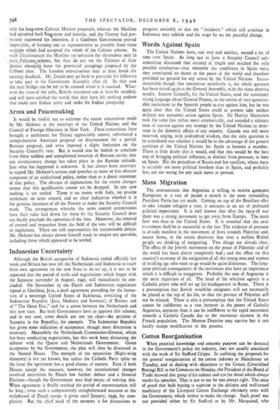Arms and Peacemaking
It would be foolish not to welcome the recent concessions made by Mr. Molotov at the meetings of the United Nations and the Council of Foreign Ministers in New York. These concessions have brought a settlement for Trieste appreciably nearer, substituted a comprehensive American proposal on disarmament for a partial Russian proposal, and even imposed a slight limitation on the Security Council's veto. But it would also be foolish to conclude from these sudden and unexplained reversals of Russian tactics that any revolutionary change has taken place in the Russian attitude. Just what has happened is unknown. It has always been necessary to regard Mr. Molotov's actions and speeches as more or less obscure symptoms of an undisclosed policy, rather than as a direct statement of that policy. The absence of explanations for the recent changes means that this qualification cannot yet be dropped. In any case nothing is yet settled. There is no treaty with Italy, no precise settlement on arms control, and no clear indication whether it is the genuine intention of all the Powers to make the Security Council work. The arrangement whereby the arms control commissions have their rules laid down for them by the Security Council does not finally preclude the operation of the veto. Moreover, the removal of control and inspection from the field of the veto will be difficult to implement. There are still opportunities for interminable delays. Mr. Molotov has always shown himself ready to reopen any question, including those which appeared to be settled.


































 Previous page
Previous page